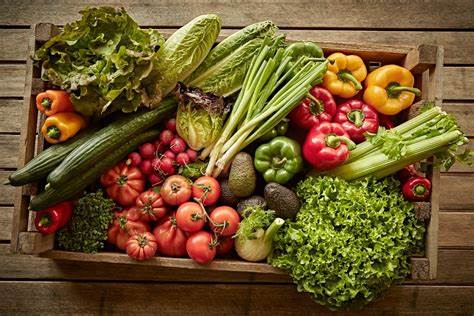Organic food refers to agricultural products that are grown and processed without the use of synthetic chemicals, such as pesticides, fertilizers, hormones, and genetically modified organisms (GMOs). Organic farming practices promote ecological balance and biodiversity, emphasizing the use of natural methods to maintain soil fertility, control pests and diseases, and support the overall health of the environment.
Here are some key features and principles associated with organic food:
- No synthetic chemicals: Organic farmers rely on natural methods and substances for pest control, weed management, and fertilization. They avoid the use of synthetic pesticides, herbicides, and fertilizers.
- Soil fertility: Organic farming places great importance on maintaining and improving soil health through practices like crop rotation, composting, and the use of organic matter. Healthy soil is considered the foundation for producing nutritious organic food.
- GMO-free: Organic standards prohibit the use of genetically modified organisms. Organic crops must not be genetically modified, and organic livestock must not be fed genetically engineered feed.
- Animal welfare: Organic animal products, such as meat, eggs, and dairy, are derived from animals raised in more natural and humane conditions. Organic standards require animals to have access to outdoor areas and be provided with organic feed and preventive healthcare.
- Certification: In many countries, including the United States and the European Union, there are strict regulations and certification processes that govern organic farming. Farms and food processors must meet specific criteria and undergo regular inspections to become certified organic.
- Environmental benefits: Organic farming practices aim to minimize the impact on the environment. By avoiding synthetic chemicals and promoting biodiversity, organic farming contributes to soil conservation, water quality protection, and reduced pollution.
It’s important to note that while organic food is generally associated with certain benefits, such as reduced pesticide exposure and potentially higher nutritional value, scientific research on the topic is ongoing, and the evidence is not always definitive. Some studies suggest that organic food may have certain advantages, while others indicate that the differences in nutrient content between organic and conventionally grown food are minimal.
Consumers choose organic food for various reasons, including health concerns, environmental considerations, and support for sustainable farming practices. Ultimately, the decision to consume organic food depends on personal preferences, beliefs, and priorities.
Who needs organic food ?
Organic food is not required for everyone. It is a choice made by individuals or groups who prefer to consume food that is produced and processed using organic farming methods. People who may choose organic food include:
- Consumers with health concerns: Some individuals may opt for organic food due to concerns about pesticide residues or potential health effects of synthetic chemicals used in conventional farming. They may choose organic to minimize exposure to these substances.
- Environmental enthusiasts: People who are environmentally conscious may choose organic food to support farming practices that reduce the use of synthetic chemicals, promote soil health, and protect biodiversity. Organic farming aims to minimize the impact on the environment, making it a preferred option for those who prioritize sustainability.
- Individuals with ethical considerations: Organic farming often emphasizes animal welfare and provides more natural and humane conditions for livestock. People who are concerned about the treatment of animals may choose organic animal products for these reasons.
- Parents and caregivers: Some parents and caregivers choose organic food for infants and young children due to concerns about their developing bodies and potential vulnerability to pesticide exposure. They may believe that organic food provides a safer and healthier option for their children.
- Supporters of local agriculture: Many organic farms are small-scale or family-owned operations. Choosing organic food can be a way to support local farmers and contribute to the local economy.
It’s important to note that while organic food may offer certain benefits, conventional agriculture also has regulations and safety standards in place to ensure the quality and safety of the food supply. The decision to consume organic food ultimately depends on personal preferences, beliefs, and priorities.
Case Study: Organic Food Market Growth
Background: The organic food industry has experienced significant growth in recent years due to increasing consumer demand for healthier, more sustainable food options. This case study examines the growth of the organic food market and the factors contributing to its success.
Case Study:
- Consumer Demand: Consumer awareness and concern for health and environmental issues have played a vital role in driving the growth of the organic food market. Increasingly, consumers are seeking out organic products as they perceive them to be healthier, free from synthetic chemicals, and more environmentally friendly. This heightened demand has led to an expansion of organic food options in grocery stores and an increase in dedicated organic food retailers.
- Regulatory Support: Government regulations and certifications have also played a significant role in the growth of the organic food industry. Many countries have established standards and certification programs to ensure the integrity and authenticity of organic products. These regulations provide consumers with confidence in the organic label and support the growth of the market by establishing trust and credibility.
- Expansion of Organic Farming: The growth of the organic food market has encouraged more farmers to adopt organic farming practices. As consumer demand increases, farmers see an opportunity to cater to this market and switch from conventional to organic farming methods. This shift requires farmers to undergo a transition period to meet organic certification requirements, which can include implementing organic soil management practices, eliminating synthetic pesticides and fertilizers, and adopting crop rotation techniques. The expansion of organic farming helps to meet the growing demand for organic food.
- Retailer Commitment: Retailers, both large supermarket chains and independent stores, have recognized the potential of the organic food market and have made commitments to offer organic products to their customers. Many supermarkets now have dedicated organic sections or aisles, making it easier for consumers to access a wide range of organic food options. This increased availability and visibility of organic products in mainstream retail channels have further contributed to market growth.
- Health and Sustainability Awareness: Growing concerns about personal health, nutrition, and environmental sustainability have driven consumer interest in organic food. Studies and research suggesting potential health benefits and reduced exposure to synthetic chemicals in organic food have contributed to its appeal. Additionally, consumers are increasingly conscious of the environmental impact of conventional farming practices and are choosing organic food as a more sustainable option.
- Price and Accessibility: While organic food was initially associated with higher prices, increased market demand has led to economies of scale and improved supply chain efficiency, resulting in more competitive pricing. This has made organic food more accessible to a broader consumer base, further fueling market growth.
Conclusion:
The organic food market has experienced significant growth due to increasing consumer demand for healthier and more sustainable food options. Factors such as consumer awareness, regulatory support, the expansion of organic farming, retailer commitment, health and sustainability awareness, and improved price accessibility have all contributed to the success of the organic food industry. As consumers continue to prioritize their health and environmental concerns, the organic food market is expected to further expand and evolve in the coming years.
Whitepaper on Organic food
Title: The Organic Food Revolution: Enhancing Health and Sustainability
Abstract: This whitepaper explores the concept of organic food and its role in promoting health and sustainability. It delves into the principles and practices of organic farming, analyzes the potential benefits of organic food consumption, and highlights its impact on human health, the environment, and local communities. Additionally, it addresses common misconceptions surrounding organic food and offers insights into the future of the organic food industry. This whitepaper aims to provide a comprehensive overview of organic food, empowering individuals, policymakers, and stakeholders to make informed decisions regarding their food choices and contribute to a more sustainable food system.
- Introduction 1.1 Background and Definition 1.2 Organic Farming Principles and Practices
- Organic Food Production 2.1 Soil Health and Fertility Management 2.2 Pest and Disease Control 2.3 Weed Management 2.4 GMO-free Production 2.5 Animal Welfare and Organic Livestock
- Health Benefits of Organic Food 3.1 Reduced Exposure to Pesticides and Chemicals 3.2 Nutritional Content of Organic Food 3.3 Antioxidant and Phytochemical Profiles 3.4 Potential Impact on Human Health
- Environmental Sustainability 4.1 Biodiversity Conservation 4.2 Soil Conservation and Carbon Sequestration 4.3 Water Quality and Conservation 4.4 Climate Change Mitigation
- Organic Food and Local Communities 5.1 Support for Local Farmers and Rural Economies 5.2 Community Engagement and Education 5.3 Social and Cultural Implications
- Debunking Misconceptions 6.1 Organic Food Affordability 6.2 Organic Yield and Feeding the Global Population 6.3 Comparisons to Conventional Agriculture
- Regulatory Framework and Certifications 7.1 International Organic Standards 7.2 Certification Processes and Labeling
- The Future of Organic Food 8.1 Market Trends and Growth 8.2 Technological Innovations in Organic Farming 8.3 Consumer Education and Awareness 8.4 Policy and Government Support
- Conclusion 9.1 Summary of Key Findings 9.2 Recommendations for Consumers, Producers, and Policymakers
References
Note: This whitepaper provides a comprehensive overview of organic food based on existing research, industry practices, and available information up until September 2021. Readers are encouraged to consult the latest scientific studies and reports for the most up-to-date information on the topic.






